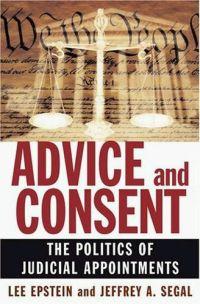

Purchase
Advice And Consent: The Politics of Appointing Federal Judge
Lee Epstein, Jeffrey A. Segal
With key appointments looming on the horizon, Advice and Consent provides everything concerned citizens need to know to understand the partisan rows that surround the judicial nominating process.
Oxford University Press
October 2005
180 pages
ISBN: 0195300211
Hardcover
Add to Wish List
Non-Fiction
From Louis Brandeis to Robert Bork to Clarence Thomas, the
nomination of federal judges has generated intense
political conflict. With the coming retirement of one or
more Supreme Court Justices--and threats to filibuster
lower court judges--the selection process is likely to be,
once again, the center of red-hot partisan debate. In Advice and Consent, two leading legal scholars, Lee
Epstein
and Jeffrey A. Segal, offer a brief, illuminating Baedeker
to this highly important procedure, discussing everything
from constitutional background, to crucial differences in
the nomination of judges and justices, to the role of the
Judiciary Committee in vetting nominees. Epstein and Segal
shed light on the role played by the media, by the American
Bar Association, and by special interest groups (whose
efforts helped defeat Judge Bork). Though it is often assumed that political clashes over
nominees are a new
phenomenon, the authors argue that the appointment of
justices and judges has always been a highly contentious
process--one largely driven by ideological and partisan
concerns. The reader discovers how presidents and the
senate have tried to remake the bench, ranging from FDR's
controversial "court packing" scheme to the Senate's
creation in 1978 of 35 new appellate and 117 district court
judgeships, allowing the Democrats to shape the judiciary
for years. The authors conclude with possible "reforms," from the so-
called nuclear option, whereby a majority of the Senate
could vote to prohibit filibusters, to the even more
dramatic suggestion that Congress eliminate a judge's life
tenure either by term limits or compulsory retirement.
With key appointments looming on the horizon, Advice and
Consent provides everything concerned citizens need to know
to understand the partisan rows that surround the judicial
nominating process.
Comments
No comments posted.
Registered users may leave comments.
Log in or register now!
| 


 © 2003-2025 off-the-edge.net
all rights reserved Privacy Policy
© 2003-2025 off-the-edge.net
all rights reserved Privacy Policy